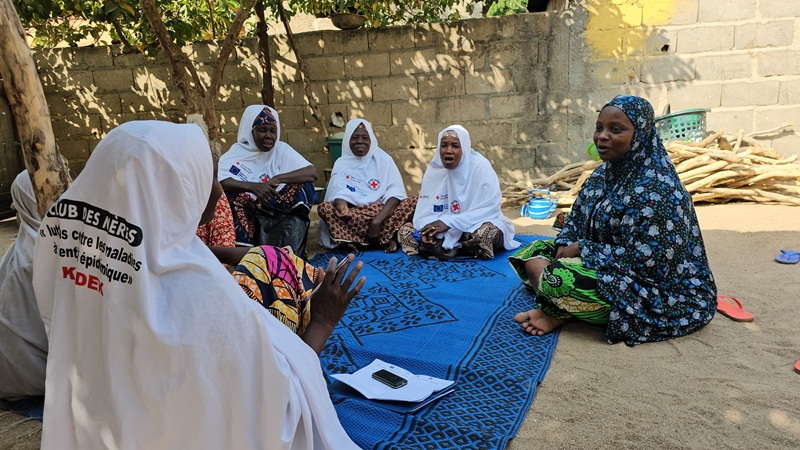Women advocating the health of their communities
Women have always been pillars of their communities, contributing to their wellbeing in countless ways. When they come together in groups like mothers’ clubs, they bring economic, social and cultural solidarity to the entire community.
Across Africa, ‘Mothers’ Clubs’ have become the beating heart of their communities, transforming how women perceive themselves and how they are viewed by others. Each Mothers’ Club is al group of around 20-25 local women, engaged as Red Cross volunteers. They meet regularly to discuss crucial topics such as health, nutrition, climate change, hygiene and sanitation. Thanks to these discussions, women gain valuable information and knowledge, enabling them to act as public health advocates at the local level. Through their awareness-raising activities, these groups significantly impact living conditions and health outcomes.
The roots of Mothers’ clubs trace back to Ghana in the 1970’s. The concept spread to Togo in 1996, as part of the reintegration activities of Ghanaian refugees. Since then, European Red Cross societies have been supporting mothers’ clubs in various countries.
In Cameroon’s Far North, the results are evident: health authorities report that more women are now regularly visiting their local health centre, hospital births have increased, and personal hygiene practices are becoming widespread. “Mothers’ clubs have been very helpful in raising awareness in households. They also help us to identify diseases with epidemic potential within communities. Take malaria – through sensitisation, volunteers have increased community members’ use of insecticide-treated bed nets. Now, the number of malaria cases has dropped significantly,” explains Manasse Kouchakbe, midwife and Interim Head of the Kodek Health Centre.

© IFRC
In the small village of Barkeol in Mauritania, mothers use circumference bracelets to screen for malnutrition, ensuring early treatment and preventing a quick deterioration of children’s health. “Mothers, being around their children every day, are best placed to detect the first signs of malnutrition. That’s why we put them at the centre of our screening strategies,” says Mohamed Abdallahi, Food Security and Livelihoods Manager at the Mauritanian Red Crescent.
© IFRC
Mothers’ Clubs also enhance women’s economic autonomy, improving household food and economic security. Members receive training, save money, and access small credits to develop income-generating activities. "Through our weekly contributions, the Mothers’ Club provides credits with an affordable interest rate to members who want to run their own small businesses. The Kaki Fada's Mothers' Club is a great opportunity for women of the village. I took out my first loan of 5,000 CFA francs (€7) only three months after starting my weekly contributions. It was a one-month loan with a low interest rate. I started a small business in the village from my home, selling basic goods: salt, sugar, seasoning sauce, matches, cassava flour and spices,” says Bassira Idi, who joined when years of drought in Niger left her struggling to feed her family.
With the tools provided by these community groups, women can make informed choices about their lives and families. As their confidence grows, many are self-empowered to make further contributions to their households and communities.
The clubs also foster social cohesion. “Thanks to the group, the women have a lot more contact with each other than before, the Mothers’ Clubs have encouraged exchanges and sharing between women, not only among members but also with other women who take part in the awareness-raising sessions,” says Loubina, Batha Village chief.
Over the decades, these clubs have promoted decision-making and resilience. Where a Mothers' Club is established, the Red Cross notes that women have a real impact on improving the living conditions of their villages and neighbourhoods and gain a central role in community organisation. These factors have contributed to the emancipation of many women and a gradual shift in attitudes towards gender equality.
More information about the Mother’s Clubs approach:
Podcast Fighting hunger through the power of motherhood and fatherhood
Empowering women through the Mothers' Clubs - Red Social Innovation

